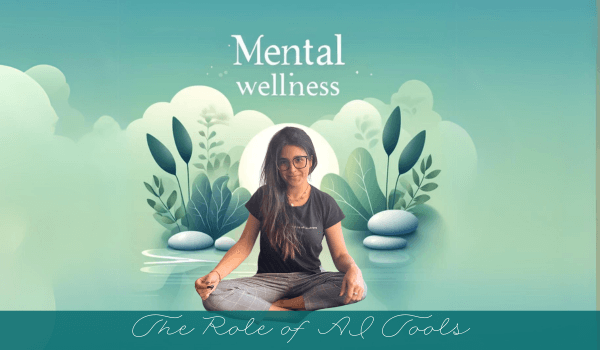Ever wished your therapist could be on call 24/7 without breaking the bank? Guess what? With AI for mental wellness, that dream is almost a reality! 🎉
In today’s fast-paced world, taking care of our mental health often falls by the wayside. Between juggling work, family, and social obligations, finding the time and resources to prioritise our mental well-being can feel like solving a Rubik’s Cube blindfolded.
But fear not! Artificial Intelligence is stepping in to revolutionise mental health care, making support more accessible and personalised than ever before.
Imagine having a compassionate, non-judgmental companion that’s always ready to listen, offer advice, and even help you meditate—all from the comfort of your smartphone. Whether you’re dealing with anxiety, struggling to sleep, or just need a daily dose of mindfulness, AI tools have got you covered.
In this post, we’ll explore the pros and cons of these digital wellness wonders, highlight some popular AI mental health tools, and take a peek into the future of AI in mental wellness. So, buckle up and get ready to discover how technology is transforming mental health care, one algorithm at a time!
Mental Health Awareness Week: Key Facts and Insights
.Mental Health Awareness Week was celebrated from May 13 to 19, 2024. This year’s theme, “Movement: moving for our mental health,” highlighted the importance of physical activity in promoting mental well-being. The goal was to encourage everyone to integrate more movement into their daily routines.
Why Movement Matters?
Research shows that physical activity significantly reduces symptoms of depression and anxiety. Just 30 minutes of moderate exercise five times a week can offer mental health benefits comparable to medication and therapy.
The Mental Health Foundation emphasises that movement can help prevent stress-related mental health issues, making it an essential part of our lives.
Exercising outdoors is even better! Fresh air, sunlight, and nature can enhance the benefits of physical activity, boosting mood and reducing stress more effectively than indoor workouts.
The Impact of Awareness Campaigns
Key General Statistics
Consider these compelling statistics:
In any given year, an estimated 25% of people in the UK experience a mental health problem.
Regular physical activity can reduce the risk of depression by 30% and significantly improve overall mood and well-being.
Awareness campaigns have been shown to increase help-seeking behaviour, with more individuals accessing mental health services and resources during and after awareness weeks.
For more information, visit the Mental Health Foundation and Mind websites.
Impact of Exercise and AI for Mental Wellness
For those who have exercised and monitored their well-being, the highlight often comes from keeping the body and mind busy and then seeing results. However, not everyone prioritises exercising. There are numerous other ways to boost mental well-being.
Here, we highlight some interesting methods that have helped many, including incorporating AI tools into these routines.

Section 2: The Role of AI for Mental Wellness
Understanding AI Tools for your Wellbeing
AI tools for mental wellness are digital platforms and applications that use Artificial Intelligence to provide mental health support. These tools range from AI chatbots that offer therapeutic conversations to mood-tracking apps that provide personalised mental wellness strategies.
Types of AI Mental Wellness Tools
There are various AI mental wellness tools available today. These include meditation apps, mood trackers, virtual therapy assistants, and AI-powered journaling apps. Each one aims to make mental health care more accessible, especially for those with busy lives.
Benefits of Using AI tools in Mental Health
Accessibility and Convenience
One of the biggest advantages of AI mental wellness tools is accessibility. These apps are available 24/7. You can seek support anytime, anywhere. That’s a game-changer for many of us.
Personalised Mental Health Support
AI tools offer personalised support. They analyse your data and provide strategies tailored just for you. It’s like having a mental health coach in your pocket!
Continuous Monitoring and Feedback
These tools continuously monitor your well-being. They offer real-time feedback, helping you stay on track with your mental wellness goals.
Reducing Stigma Around Seeking Help
Using an app can feel less intimidating than talking to a person. This can help reduce the stigma around seeking mental health support. It’s a great first step for many who are hesitant to reach out. Find further info Here.

Section 3: Exploring AI Tools – Strategies –
Calm: Meditation and Mindfulness
Calm is a popular app designed to promote relaxation and mental well-being through guided meditation and mindfulness exercises. This app offers a range of programs tailored to different needs, from stress reduction to improving sleep.
I discovered Calm while researching stress management techniques at university. Although meditation can be challenging for some, many people, including myself, find that the guided sessions in Calm make it easier to practice mindfulness and achieve a sense of peace.
Fitbit and Apple Watch: Tracking Physical Health
Wearable devices like Fitbit and Apple Watch are invaluable for monitoring physical health and activity levels. These devices track steps, heart rate, sleep patterns, and even mood, providing a comprehensive view of your well-being.
Using my Apple Watch, I can set fitness goals, monitor my progress, and receive reminders to stay active. These features help maintain a balanced lifestyle, which is crucial for mental wellness.
Whoop Band: Advanced Health Monitoring
Another fantastic tool on my wish list is the Whoop Band. This wearable device is great for serious health enthusiasts. The Whoop Band provides detailed insights into your recovery, training, and sleep patterns.
It tracks heart rate variability, skin temperature, and even respiratory rate, giving you a comprehensive understanding of your body’s needs. With personalised feedback, it helps you optimise your workouts and recovery, ensuring you maintain peak physical and mental health.
Mindsera: AI-Powered Journaling
Mindsera is an AI-powered journaling app that helps organise thoughts, emotions, and habits. This app is perfect for those who find self-reflection and journaling more effective than traditional meditation.
During my university years, I learned the importance of self-reflection through numerous reflective essays and workshops. Initially skeptical, I soon realised the value of documenting my thoughts and experiences.
Mindsera takes this a step further by providing insights and patterns, helping to make sense of mental chaos.
Virtual Therapy and Consulting
Virtual therapy and consulting have made accessing mental health support more convenient. Platforms like BetterHelp and Talkspace connect users with licensed therapists through video calls, messaging, and phone sessions.
This flexibility allows individuals to receive professional help from the comfort of their homes. Additionally, some life insurance providers offer health apps that connect users with mental health professionals, making it easier to access the support they need. These services are incredibly helpful for managing stress and maintaining mental well-being.

Conclusion: Embrace AI for Enhanced Mental Wellness
In conclusion, integrating AI tools into your daily routine can significantly improve your mental wellness. Whether it’s exploring meditation apps like Calm, using wearable devices like Apple Watch or Fitbit to monitor exercise and mental health, or utilising mood-tracking apps.
These technologies offer practical solutions to manage stress and enhance well-being. Millions of people have experienced positive impacts by keeping their minds and bodies active while seeing tangible physical and mental results.
Remember, the key is to find the tools and methods that resonate with you. Everyone’s journey to mental wellness is unique, and what works for one person may not work for another. It’s about discovering the right balance and tools that cater to your individual needs.
I hope this post has provided valuable insights and inspired you to explore AI tools for your mental wellness journey. For more tips and in-depth guidance, subscribe to my blog and receive a free ChatGPT guide specifically designed for busy families. Read my previous post to find out more information about How AI can help in your daily life.
Don’t forget to follow, comment with your own stories, tips, or hacks you use, and share how you’re integrating AI into your daily routines. Your feedback and experiences are incredibly valuable!
Gracias





